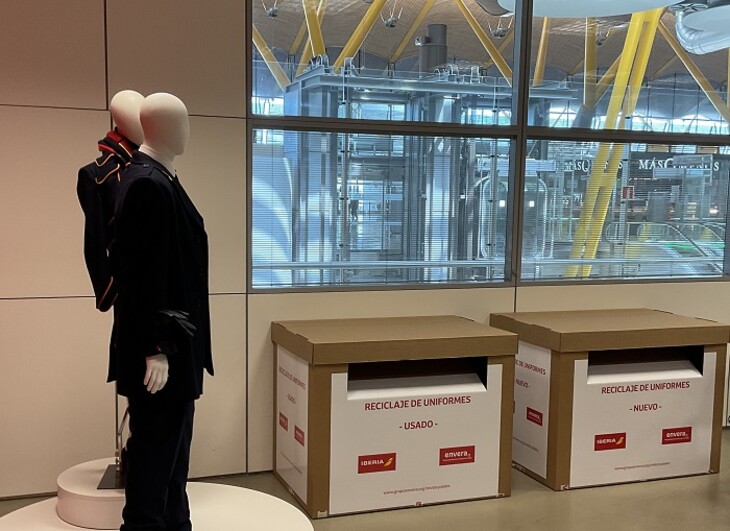
On 1 June, Iberia presented its new uniform, designed by Teresa Helbig, which is already being used by its cabin crew and staff at the Madrid airport.
In parallel, the airline, together with Envera, launched the non-profit Association of Iberia Employees - Parents of People with Disabilities, a project that seeks to give a second life to the previous uniforms.
The project addresses both environmental and social issues: on the one hand, it is based on the circular economy, which optimises the use of materials and products, applying the reduce, reuse, and recycle philosophy, and, on the other hand, it will provide employment to people with disabilities, through Envera. On average, Iberia’s members of staff each own fourteen items of clothing and accessories, which represents more than 50 tonnes of textile products.
The first two tonnes of these garments have already been collected and classified, so that they can be donated or transformed into other materials.
Reduce, Reuse and Recycle
With this project, Iberia and Envera show their commitment to sustainability, repurposing and recycling, the circular economy and green employment.
80% of the garments from the previous Iberia uniform will find a second life through charitable donations that will contribute to improving the lives of vulnerable people and refugees. Specifically, they will go to social projects in Spain, organised by the Red Cross, Cáritas Diocesana, CEAR, Mensajeros de la Paz, Fundación Hospital San José, Mundo Justo and Fundación Atenea, as well as international development cooperation programmes by AUDE, the Equipo Vicente del Bosque in Senegal, Hombre Nuevo Tierra Nueva, Volunteers for Africa, the Humana People to People Foundation and the Iberia staff NGO Mano a Mano.
The 20% of garments that cannot be reused will be recycled into other materials, and those that are discarded will be used for energy recovery as fuel.
Along these lines, the Iberia airports business, Iberia Airport Services, is also carrying out a sustainable initiative to recycle its red polo shirts, which, being made entirely of cotton, can be completely recycled. The thread will be used at local and inclusion workshops to make new polo shirts for the same Iberia Airport staff.
In this way, the airline puts the focus on the new economic model of reducing, reusing, and recycling, as part of a system of repurposing, which contributes to the rational use of natural resources without compromising the future of the next generation.
Reusing textiles also contributes to the fight against climate change: for every kilogramme of clothing that is repurposed, 6.1kg of CO2 emissions are cut, according to a study by the Humana People to People Foundation.